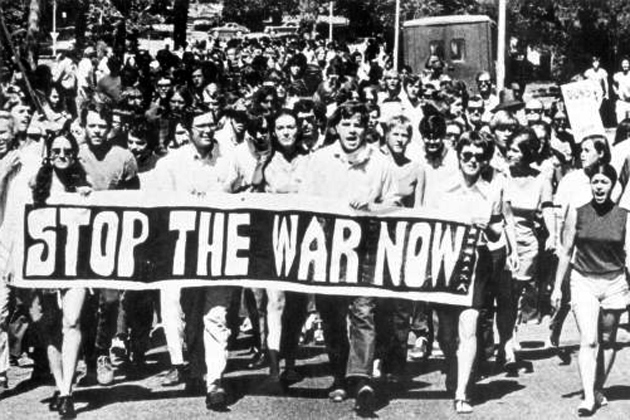
The assassination of JFK; the civil rights, women’s, and free speech movements; Vietnam; the Cold War; and an array of social inequities made the 1960s and ’70s one of the most compelling and challenging eras, not just in the history of the United States, but in the history of higher education.
Neag School of Education alumnus Steve Nelson Ph.D. ’96 focuses his recent book Decades of Chaos and Revolution: Showdowns for College Presidents (Rowman & Littlefield Education 2012) on this period – often telling the story in the words of the college presidents themselves – and compares the challenges they faced with those facing college presidents today.
“College presidents in the 1960s through about 1975 faced events that shook the foundations of academia, and today’s college presidents are grappling with many parallel issues and, really, much of the same chaos and criticisms that presidents 50 years ago also experienced,” said Nelson, a Rhode Island resident and associate professor of educational leadership at Bridgewater State University. “What I do in this book is throw out a lot of ideas for people to read, chew over, and take me up on if they wish.”
College presidents in the 1960s through about 1975 faced events that shook the foundations of academia, and today’s college presidents are grappling with many parallel issues …
This is Nelson’s fourth book about the successes and challenges of U.S. college presidents. Nelson says his interest in the subject emerged in the mid-1990s, while he was working on his Ph.D. in higher education administration at UConn, under the guidance of now-emeritus professor William Jellema, who was his advisor.
“I told Dr. Jellema that I was interested in how college presidents use rhetoric to command a public stage, and that turned into both my dissertation and my first book, [Leaders in the Crucible:] The Moral Voice of College Presidents [Greenwood Publishing Group 2000],” says Nelson, who is also a senior scholar in the 32-member Leadership Alliance at Brown University. “Some people are natural born researchers, and I discovered that not only did I have researching in my blood, but a real passion for college presidents and becoming a champion, of sorts, for their role as intellectual leaders. Thus, the four books.”
In Decades of Chaos and Revolution, Nelson compares college presidents of the ’60s and ’70s with those of the early 21st century, questioning which of the two eras required more profound leadership.
“It’s not giving anything away to say that I believe the 1960s to the mid-1970s was the most difficult for college presidents in the entire history of higher education in America,” says Nelson. That to me is the bottom line, and I really feel this most recent book is my best.”
His other two titles are Leaders in the Crossroads: Success and Failure in the College Presidency (Rowman & Littlefield Education 2009) and Leaders in the Labyrinth: College Presidents and the Battleground of Creeds and Convictions (Greenwood Publishing Group 2007).



